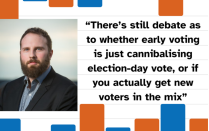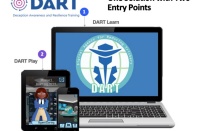CII Featured on What's Next Podcast

The October 1st showing of the first film in our series, Coded Bias, drew the attention not only of UB faculty and students, but of our local public radio station, WBFO.
As part of the local program “What’s Next,” David Castillo, E. Bruce Pitman, and Jasmina Tacheva spoke with Jay Moran about how misinformation and generative AI can affect access to reputable information on elections, as well as the upcoming film screening of “Coded Bias.” You can listen to that conversation in two parts: the first is here (at timecode 39:48) and the conclusion is here (at timecode 34:30). You can also search for “WBFO What’s Next” wherever you get your podcasts.
About the Speakers

An expert in mathematical modeling, for the last two decades he has been studying uncertainty quantification – techniques for understanding uncertainty in models of physical or biological systems, and how computing can account for these uncertainties.

Bridging quantitative, qualitative, and critical methodologies, particularly transnational feminist theories, her work investigates the intersection of data, technology, and societal impacts, and has been featured in journals such as Big Data & Society. Her most recent work is focused on a critical analysis of the complex ecosystem of AI technologies and their connection with the propagation of mis- and disinformation.

Castillo is a recipient of the UB Exceptional Scholar Award for Sustained Achievement. His work in early modern literature and cultural history focuses on the damaging effects of inflationary media, including the proliferation of deceptive illusions and manipulative disinformation, and what we can learn from the “reality literacy” strategies of Miguel de Cervantes and other authors of the Spanish Golden Age to help us survive our post-truth age.



